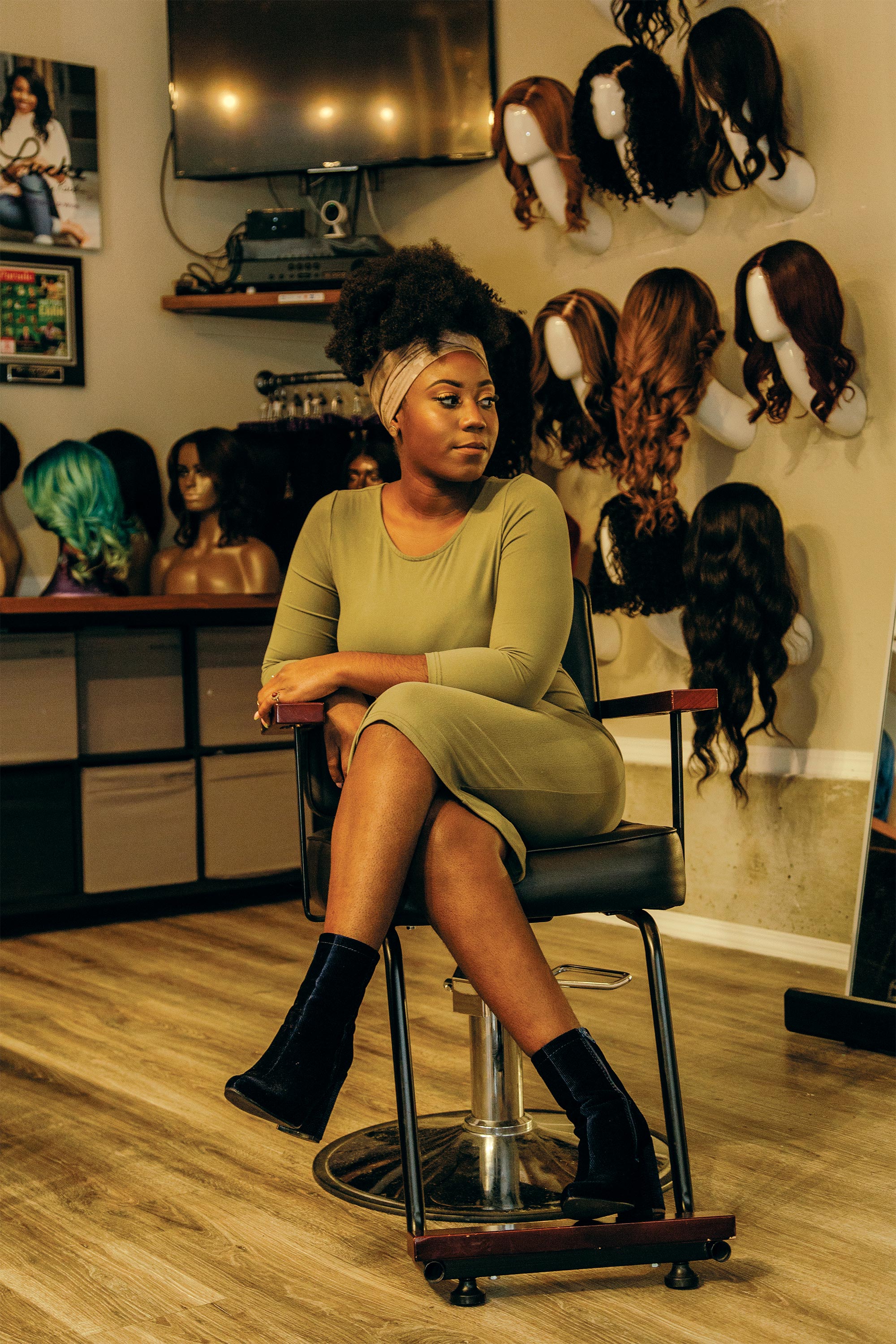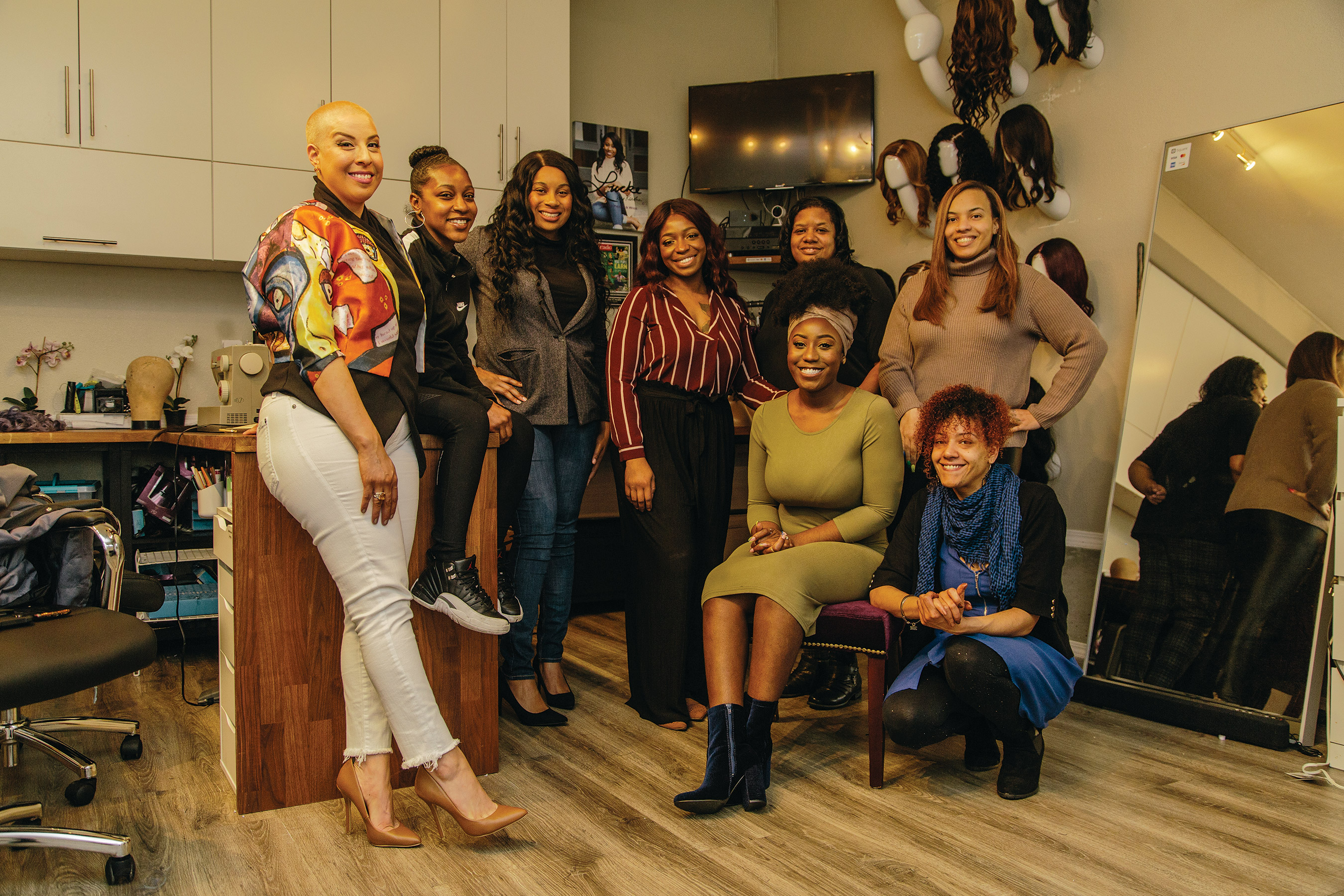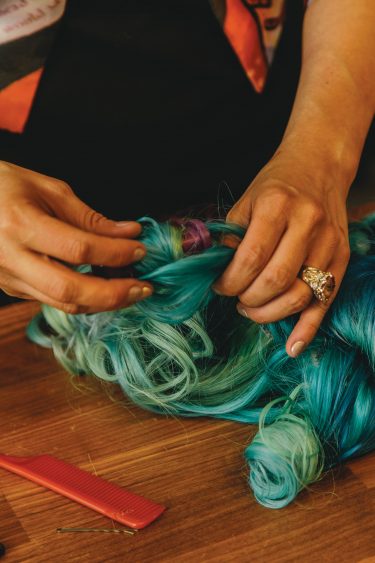Big
wig
Big wig
Big wig
UW’s startup culture nurtures a growing number of students, proving that an idea, some energy and valuable mentoring can bring business success.
By Hannelore Sudermann | Photos by David Jaewon Oh | March 2020

Last fall, over cocktails in Cabo San Lucas, Keisha Credit, ’11, ’18, found herself talking about income disparity to a friendly stranger in the bar. The disparity gap makes things harder for entrepreneurs of color to prosper. It’s a subject the Seattle-based business owner thinks a lot about.
“It was my birthday. I was there on vacation,” she says. “But this is what I wanted to talk about.” As she was unwinding over drinks and her conversation with the other woman turned to race and business, Credit started sharing the details of her startup experiences. The other woman, it turns out, was a senior contributor for Forbes magazine. And last November, Forbes highlighted Credit as a serial entrepreneur who, despite the disparity gap, has managed to create several successful businesses, including a seven-figure custom wig company.
“People of color know hustle,” says Credit. “But to know what it takes to have a business, we don’t have that.” Building a business is more complex, with relationships, politics, culture and many other things “we don’t get exposed to on an everyday basis.” But by self-starting her first business with only instinct and courage, and then pursuing a graduate program in entrepreneurship at the UW, Credit has charted her own path to success. In some ways, her story is rare. In others, it’s another great tale of a Pacific Northwest startup.
Credit literally lives her work. The two-car garage of her South Seattle home is made over into the warmly furnished headquarters of Lucke by Keisha. “You are in the Lucke studio,” she says gesturing around the room. Mannequin heads adorned with thick, lustrous wigs line the back wall. In the far corner, one of Credit’s employees styles a bob with a brush and a flat iron. Further to the left, another worker wraps up a few hairpieces that she will take away to color. And a third woman sits focused on a laptop, corresponding with customers. In all, Credit has six employees. “And I do all the other stuff,” she says.

Keisha Credit, seated, is pictured with her employees and some of the women she mentors in starting their own businesses.
Credit didn’t take a straight road to owning a business. She had planned on a Microsoft career, having interned at the company as a Garfield High School student. She enrolled at the UW to study programming, but quickly realized it didn’t suit her. “I took one class and I dropped it,” she says. She had started college as a junior thanks to Running Start, and suddenly she needed a new major. She chose sociology. Then, feeling she was too young to graduate and jump right into work, she added a communication major and stayed another year.
While at the UW, Credit started her first business venture—a house-painting company. “I wanted to create opportunities for my friends. I didn’t realize at the time I was acting like an entrepreneur.” After graduating, she did what her family expected and went to work for Microsoft. As a program manager, she traveled the world and captured customer experiences to bring back to headquarters. “But I wasn’t fulfilled,” she says. “I didn’t feel important. I felt like a number.”
At the same time, a personal trip to Ghana provided a chance to explore her heritage. The experience of self-discovery prompted her to change her hair. “I decided to cut it off and grow this big Afro,” she says. While the new style suited her personally, it wasn’t going to fly in the corporate world, says Credit. “You should wear a wig,” her hairdresser suggested. In fact, Credit could probably make her own wig, the hairdresser said. High-quality and made with human hair, it would be far better than the products generally found in wig shops.
Soon, Credit was not only making custom wigs for herself, she was making them for her Delta Sigma Theta sorority sisters. She was a corporate tech manager during the week and a wigmaker on the weekend. Nine months later, and three years after graduating from the UW, Credit quit Microsoft.
“I didn’t tell my family what I was doing,” she says, explaining that in her circle, and in the greater African American community, people worry when they see you leave a good-paying job. She just told her folks she was burned out and needed a break. She wasn’t even sure what her big venture would be. “But the wig business was already going,” she says with a shrug. “So I did that.” Her first-year sales grossed more than $60,000.
View this post on Instagram
The next couple of years flew by. Word spread about Lucke, and an increasing number of customers from around the region—and a few from around the world—were eager for her high-quality custom wigs.
“I knew the company was growing, but I didn’t know why,” Credit says. “I didn’t understand organic vs. strategic growth.”
That need to know more drove her back to the UW where, in 2017, she enrolled in the inaugural class for a master of science in entrepreneurship degree. The yearlong program was built for students to bring their startups to life. Credit was one of the few who already had a successful business. “Most of my classmates wanted to be tech entrepreneurs. They wanted to invent the next PayPal,” she says. “But I had a great connect-the-dot, make-a-product business.”
Thirty years ago, when the notion of creating a center for entrepreneurship at the UW was floating around campus, it was rare for students to start up their own businesses. Now the University has such a center, named for Arthur Buerk, ’58, a serial entrepreneur who helped establish it, and the scene is quite different. Today students come to the UW with a great startup idea or a business already underway. They’re hoping to find the tools and classmates to partner with to make it real, says Amy Sallin, director of the UW’s Buerk Center for Entrepreneurship. “They find us because they already know what they want to do. It’s in their DNA.”

Lucke by Keisha, Credit’s most successful business to date, specializes in crafting custom wigs with human hair.
Maybe there’s something in the water here. The Northwest is widely known for its startup culture from the epic stories of companies like Costco, Microsoft, Amazon and Starbucks to the nearly $4 billion in funding—according to GeekWire—directed to startups in our region last year. While much of the scene is software-oriented, retail should not be overlooked, says Suresh Kotha, professor of management and research director at the Buerk Center. “We’re in the five top communities in terms of creating companies,” he says, adding us to a list that includes the Bay Area, Austin, Boston and the research triangle in North Carolina.
The region has a vibrant community of small businesses, says Kotha. With two business support programs, the UW can share in the credit for the startup energy. CoMotion, a collaborative innovation hub started at the UW in 2009, helps researchers patent, license and launch startups for the technologies they create. Meanwhile, the Jones + Foster Accelerator at the Foster School of Business is strictly for students, designed to help them through the first six months of creating their own companies.
Of the 55 concepts that have gone through the Jones + Foster Accelerator, 48 are still in business. Last year’s awardees offer a sampling of the greater Seattle startup scene. Knitrino, for example, is an app created by two sisters for modern-day knitters who can access interactive patterns through their mobile devices. DopCuff’s team is developing a device that allows certain end-stage heart-failure patients to measure their blood pressure from home.
For one group of students, the way to a startup is through technology. Amin Shaykho, ’18, and his friends have developed a mobile platform where users can request services like tutoring, house cleaning or dog walking and providers can earn money by doing jobs on their own schedules. Shaykho and a friend came up with the idea when they were in high school, wishing they could hire people to help them with their chores at home.
“We developed that idea into something with wider appeal,” says Shaykho. And to make it succeed, they wanted to ensure that it was fast, easy and affordable,
he says. Students with complicated class schedules, for example, could find side jobs “as long as they were background-checked, they could just hop on our app and find work,” he says. The first iterations were rough, admits Shaykho. “We had to learn to write code, and I had to mock up the designs for the app. I’m embarrassed now because they were really terrible.” But through their studies at the UW and by being admitted to the Jones + Foster Accelerator, they’ve had mentors, pro-bono legal advice and resources to smooth their way. Their hard work paid off in February when the team received $25,000 in seed money.
The app, which they’ve named Kadama, is already in use by student tutors with expertise in subjects like math, history and music. Having officially launched the app in November, Shaykho and his team hope to soon expand the services to include errands, pets, housework and yardwork.
Shaykho, who graduated last year, is now a project lead at Apple in Cupertino, California. But he often travels back to Seattle to work with the rest of the team, including co-founder Marwan El-Rukby, who completed his degree in business administration in December.
Now a mentor to UW student startups, Lisa Hjorten wishes the Buerk Center and the accelerator existed when she was a student in the early 1980s. “I would have been all over it,” she says. “From age 7, I was trying to figure out what I could sell to my neighbors. My whole life, I was always working on something.” Today she is a serial entrepreneur, having co-founded one tech company and solely founded another. She now runs another startup, Pacific Edge Properties, a real estate business. One thing Hjorten did learn to do as a student was play the student card to get into companies and talk to leaders and hiring managers. “I would just call and say I’m a student at the UW and I want to do an informational interview.” Now she urges current students to do the same. “Go see them. Build a relationship. They want to help you,” she says.
One of her favorite UW startups to mentor was Sugar + Spoon, a 2018 project in the accelerator founded by Ivana Orlovic and William Hubbell. The two met in a Foster School class called “Creating a Company” and hit upon the idea of developing a safe-to-eat raw cookie dough. “I love them,” says Hjorten. “They were like sponges. If we made a suggestion, they just did it. Almost to a fault.” They showed up for each of their monthly meetings eager for more ideas “and so grateful for the help.” Today they have two food trucks, a storefront on the Ave and a team of employees.
The Buerk Center sees students from across campus, says Sallin. Students in environmental engineering and applied physics, for example, want to get a degree in their science and then create something themselves, she says. “It’s not because they want to make millions of dollars. It’s because they see a way to make a difference and want to do it sooner rather than later.” After the UW added a minor in entrepreneurship, the draw to the center deepened. “We now have 300 students from 40 different majors,” Sallin says. “They come from all across campus, take classes together and form truly interdisciplinary teams.”
And exciting things continue to happen at the undergraduate level. Because of demand, the “Creating a Company” class has expanded from one session to five. Students form teams to find ideas, write plans and pitch their businesses in the first quarter, and then get a bank account and the chance to start up in the second quarter. In 2015 students Sam Tanner and Peter Keckemet took their idea for caffeinated chocolate for hikers to a business plan competition and then to the Jones + Foster Accelerator. Six months later they had their first round of seed funding for Joe Chocolate Co. and moved into a production facility. Today they have a wholesale production facility in South Seattle, a factory and shop in Pike Place Market and products on store shelves (including REI and Whole Foods) across the country.
When it comes to startup ideas, “we see everything,” says Sallin. “I think it reflects the Seattle ecosystem. We’re not all tech. It’s very interesting and well-rounded.”
Keisha Credit is putting her experience and education to work again, connecting back to the UW this time as CEO of Paca y Paca, a scented candle company that “reinvents” the candle with refillable soy wax, phthalate-free inserts. The idea started with Zachary Dodds, an engineer currently enrolled in the UW master’s in entrepreneurship program who met Credit at a Foster School event. He asked her to cofound his company and help him apply to be in the latest Jones + Foster cohort. After praying on it, Credit agreed.
“I’m thankful that the entrepreneurial landscape is shifting,” says Credit. “Now it’s being celebrated that you are leaving your job to follow your dream. It’s the cool thing now.”
But, she’s quick to say, you have to be willing to sacrifice for your business, “willing to lose it all, willing to endure the stress and willing to have the fun to get there,” she says. “This is fun for me. But it’s not for everybody.”
From socks to sweets, here’s a sampling of other UW student startups.
A-Alpha Bio
This startup is about screening drugs before they go to clinical trials. Based on David Younger’s thesis work, the team developed AlphaSeq, a new high-through-put approach for testing the effect of a drug on thousands of protein interactions (and potential side effects) simultaneously. The screening could reduce the amount of time it takes to get a drug to market.
Strideline
As high schoolers in 2009, Riley Goodman and Jake Director started their sock company in a garage with $700. As college students at the UW, they sold socks out of the trunks of their cars. Their colorful footwear, which they want to be “the most comfortable socks on Earth,” have been worn by NFL players and celebrities, and are sold through major retailers such as Nordstrom.
Discovery Health
This company provides medical support to remote worksites through tele-medical access to expert emergency and occupational medicine physicians. The business now has more than a dozen clients in the commercial fishing, towing, transportation, and cruise industries, including Trident Seafoods and Foss Maritime.
Membrion
This clean-tech startup developed by Greg Newbloom, ’14, and Professor Lilo Pozzo engineers flexible membranes using silica gel—the material in the small bags included with products to help them stay dry. Silica gel also can be used in water purification, batteries, fuel cells and gas separations. UW-trained engineers and chemists make up much of the team. The company now has $1.5 million in National Science Foundation funding.
Uphill Designs
After hiking the Pacific Crest Trail from Mexico to Canada, Dan Sedlacek, ’14, decided to share his handmade hiking gear with others. At the UW, he started working with fellow engineering student Mounica Sonikar, ’14, and MBA student David DeBey, ’15, to design and build an environmentally friendly trekking pole. Today Uphill Designs makes sustainable bags and purses.
Sugar + Spoon
Classmates Ivana Orlovic, ’18, and William Hubbell, ’18, created Seattle’s first safe-to-eat cookie dough. By eliminating eggs and using heat-treated flour in their recipe, the founders of Sugar + Spoon have been satisfying cravings across Seattle through their two food trucks and a storefront on the Ave.
Seattle Strong Coffee
The “best cold brew coffee” maker in Seattle was founded friends Evan Oeflein, ’18, Emileigh Thylin, ’17, ’18, and Brian Wipfler, ’18. The company born out of a class assignment has two main products—Nitro Cold Brew and Nitro Dirty Chai—which are sold in over 100 locations across the Pacific Northwest.
SclObo
This streetwear apparel brand was created for gamers by gamers: UW Bothell students Niko Richardson, ’17, and Jonathan Augustus, ’19. Each piece of clothing comes with a collectible card and bears art that is specific to the card. “Gamers are an underserved group in fashion,” says Richardson.
TourniTek
The medical-device startup committed to fighting limb amputations through pre-hospital treatment was founded by MBA alum Logan Jacobs, ’17, and Shahram Aarabi, a vascular and trauma surgeon. The technology behind TourniTek was developed by a group of UW medical researchers.